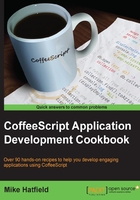
What this book covers
Chapter 1, Getting Ready, introduces CoffeeScript and lays the foundation to use CoffeeScript to develop all aspects of modern cloud-based applications.
Chapter 2, Starting with the Basics, covers using CoffeeScript with strings, numbers, dates, arrays, and classes.
Chapter 3, Creating Client Applications, demonstrates using CoffeeScript with various UI libraries and frameworks, including jQuery, Backbone, Angular, and Socket.IO.
Chapter 4, Using Kendo UI for Desktop and Mobile Applications, demonstrates how to use CoffeeScript with Telerik's open source Kendo UI Core framework to create both desktop and mobile applications.
Chapter 5, Going Native with Cordova, demonstrates how to use Apache Cordova with CoffeeScript to create native applications that can access native device features such as camera, geolocation, and contacts and be deployed to physical hardware.
Chapter 6, Working with Databases, covers various database technologies, including SQLite, Redis, MongoDB, and CouchDB, and how CoffeeScript can be used with each technology to perform create, read, update, and delete operations.
Chapter 7, Building Application Services, dives into the aspects of building the backend services needed by our application with a look at building RESTful services, working with Base64 encoding, and using domain name services to do DNS and reverse DNS lookups.
Chapter 8, Using External Services, examines ways to use existing services to send text messages and e-mails, use the Amazon cloud storage, and transfer files via FTP.
Chapter 9, Testing Our Applications, is dedicated to using CoffeeScript to test our applications using test frameworks such as Jasmine, Mocha, and Zombie as well as creating mocks using Persona.
Chapter 10, Hosting Our Web Applications, explains how to prepare your application for deployment using Grunt, and how to deploy to popular cloud hosting solutions such as Heroku and Windows Azure.
Chapter 11, Scripting for DevOps, examines ways that CoffeeScript can be used to help with day-to-day operation tasks such as working with files and directories, CSV and fixed-width data files, generating PDF files, and formatting data for output.